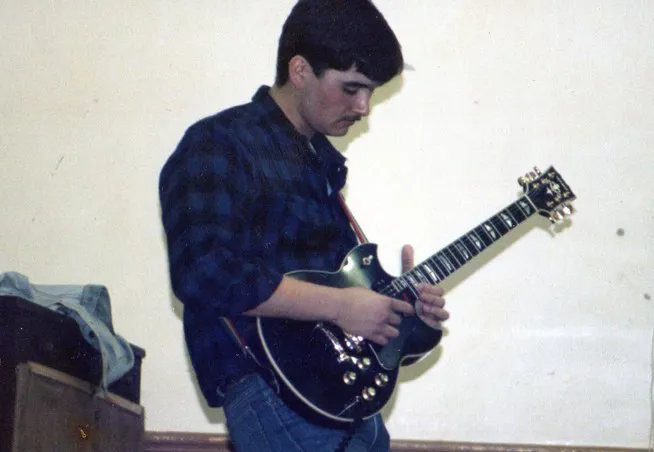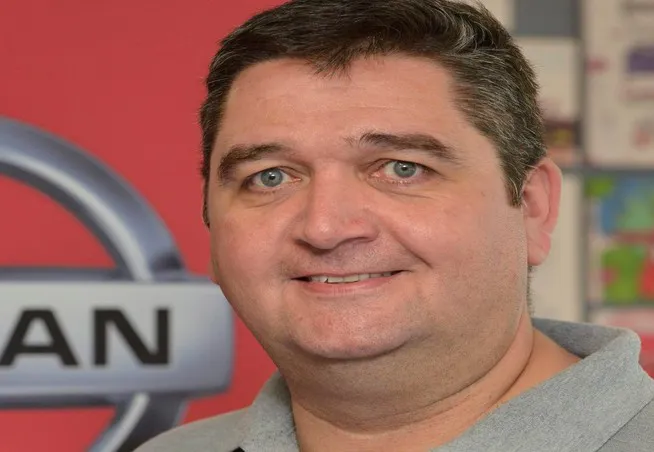Ian Green, Senior Controller/Section Manager Nissan Training, Global Training centre and Nissan Skills Foundation
As a child Ian loved table top games like Subuteo, outdoor activities and playing on his computer. Ian always dreamed of becoming a musician but he knew that this was only a dream so focused on the academic side of things as a back up plan. After school, Ian began an apprenticeship in an automotive company and he worked his way up from there. The rest as they say is history!
Age: 53
Job title: Senior Controller / Section Manager Nissan Training, Global Training centre and Nissan Skills Foundation
Company employed by: Nissan Motor Manufacturing UK
When you were a child, what did you dream you’d be when you grew up?
I always wanted to be a musician but I knew that was my dream job so focused on the academic side of things just in case I didn’t make it. I liked and had an aptitude and love of Metalwork (as D&T was known then).
What is the biggest impact your work will or could have in the future?
I have been incredibly lucky in that I have worked in learning and development for over 20 years and have had involvement in a wide range of very different projects. I was responsible for creating and delivering training for the set up and launch of two new factories in Russia and India. Both of which were incredibly successful. I was also responsible for the creation and delivery of the training plans for the launch of the Nissan Battery plant and the all-electric Leaf vehicle.
Professionally these achievements have all been very significant to me, but the thing which will hopefully have the biggest future impact was my establishment of the Nissan Skills Foundation in 2012. This was created to bridge the gap between Nissan and schools, promoting apprenticeships and graduate entry. The NSF is a huge departure from my day job of running Nissan training, catering for the plants development needs. The foundation offers both structured classroom sessions and tailored events based upon needs. It engages with Primary, Secondary and Tertiary institutions. Getting young people interested in STEM, with activities from Year 3 Primary.
Since its launch the Foundation has engaged with 350+ schools growing from 335 children and four schools in 2012 to 12,000+ students and 180+ schools engaging annually. Very proudly, in November 2019, we passed the 60,000th student who has completed activities greater than 4 hours duration!
What excites you most about STEM?
The huge variety of career paths that it can lead to. I came from a technical engineering apprenticeship background and have ended up within learning and development working globally for a multinational company. I have gone from a technical facility repair role into manufacturing management into purchasing supplier development and finally into a human resources position. Having that STEM background allows that huge movement and can provide a career not just a job.
What do you love about your job? What would you change?
I love getting to work with a huge range of people in a wide range of locations; having the opportunity to hopefully inspire and highlight to young people what opportunities exist for everyone and not just those from the “right background” or gender. I have been lucky enough to travel around the world with my job which is fantastic. However, I basically end up working in industrial estates in different parts of the world so it is not sometimes as glamorous as it first sounds. If I never sit on a plane again for a long haul flight which isn’t leading to several weeks sightseeing and relaxing I would be happy with that!
What gives you the most job satisfaction?
Seeing the impact that the work of my team has had on people. I have seen a lot of people who I have worked with moving into senior positions within my own company and in other businesses. Seeing young people who have come through school programs, progressed onto apprenticeships and are now starting their own career journeys.
What does a typical day at work involve?
My work days can be very varied, however every day starts with the slog of answering emails which have come in from around the world and different time zones; a short section meeting with all of my team; and then dealing with whatever issues need my attention. I attend a lot of meetings both regionally and nationally so have a very full diary but try to spend at least some time with as many of the individual members of the team as I can each day as well.






What’s the most unexpected thing about your job?
The huge variety! I can go from very technical meetings working with other Automotive manufacturing companies and government on strategies for electrification training and then be in a classroom full of primary children taking part in one of our school events.
Did you have any role models when you were younger? What inspired you to do the job you’re doing now?
At school I didn't really have any role models and apart from musicians no one that I aspired to be. However as an apprentice I had many days working with the older experienced staff who taught me as much about life as they did work and technical skills. I truly believe I learned something from every one of the people I was assigned to even if some of them taught me to never treat people the way they did.
Up until the second year of my apprenticeship I had always struggled with maths and I just thought it was me. However in the second year the college maths teacher totally changed that. I went from someone who scraped a pass to someone who achieved two distinctions in maths and that was when I realised what a good teacher can do. I have tried to carry that on whenever I stand up to teach people in every subject area.
Any influential toys during childhood?
I am old, so table top games (Subuteo an ancient flick to kick football game) and outdoor activities were the key things for me until the launch of computer games which was in the later years of my secondary school life. The Atari and Vic 20 games machines became the focus for me in my mid teens. These games introduced me to the world of technology, it was not until 1987 (four years after I left school) that the first Amstrad desktop computers appeared in the factory that I worked, two machines in a company employing 700 staff.
Your favourite subjects at school?
I don’t think I can pick only one. The three topics I enjoyed equally (and this was as much to do with the quality of the teaching as it was the subject) were Metalwork, Biology and History. Metalwork had a huge range of practical skills, working on the forges, welding, and machining and hand skills. Biology taught by one of the best teachers in the school and history as I was interested in facts and dates.
Qualifications (school/college/university):
I left school with 11 GCE’s grades B and C’s. As part of my apprenticeship I studied at a local technical college on day release and night classes and passed my Ordinary National Certificates and Higher National Certificates in engineering with a Production bias. I spectacularly failed at my attempt to do a part time Mechanical Engineering degree in 1989 and then didn’t study again for ten years. As part of my role in training in 2001 I completed a Level 4 NVQ in Learning and development and from that went on to do a Masters Degree in Human Resources which I achieved a Distinction in 2006. I am currently two years into a Professional Doctorate program where I am looking at the key influencing factors on career selection.
Your reason for choosing this career?
In the 1980’s in the North East there were almost set career paths - boys would join the Mining or ship yard industries or the armed forces and girls would go into the clothing industry, nursing or civil service.
Very few of my school friends studied A levels and from my year group of 127 children only 3 carried onto university. My older brother was an electrical apprentice in the coal mines but I didn’t want to work underground and when I left school the shipyards were in the last years leading to closure. In my final year of school I really did not like classroom academic study and couldn’t contemplate A-levels or university. I saw an apprenticeship as a good route for someone who enjoyed practical skills and had a reasonable academic level.
Tell me about your career path to date?
In 1983 I left school to join an Automotive company who made engine parts as a technical apprentice. I was playing guitar in bands at the time and although that was my dream the apprenticeship was my fall-back plan. When I came out of the apprenticeship in 1987 my boss persuaded me to move from the engineering side of the business into the manufacturing side and at age 20 I was given my first section of staff to look after. Around the same time Nissan had launched and were becoming a bigger business in the region , worrying about the long term future I left to join them in 1991. I was in charge of setting up and launching engine machining for the New Micra. I did this until 1993 when following a major car accident I ended up changing careers initially into Purchasing doing supplier development then in 1996 moving into training.
If you could have any job what would it be? How does it differ from what you’re doing?
My current job gives me a huge amount of satisfaction and the growth of the school engagement element and the opportunities this has created tick every box for me. I would still love to have been a full time musician playing in bands but only a very small handful of people end up making a career out of that.
Your advice to a young person considering a career in STEM?
Have your dreams and don’t be limited in what you want to achieve, but have a fall back plan in case those things don’t happen. Don’t accept that where you start and your background is any barrier to entry and progression. Hard work, perseverance and the right attitude can take you a very long way.
